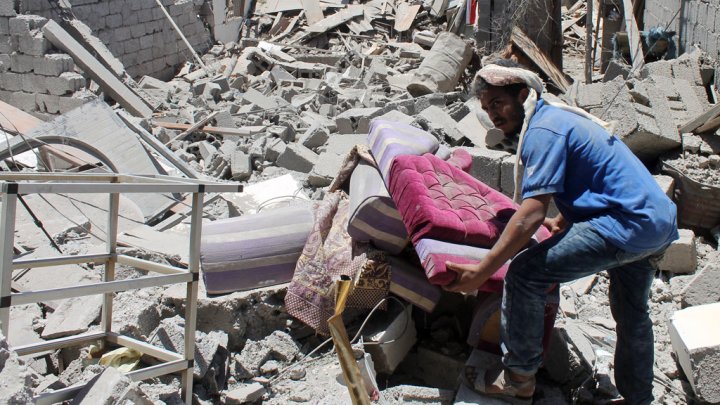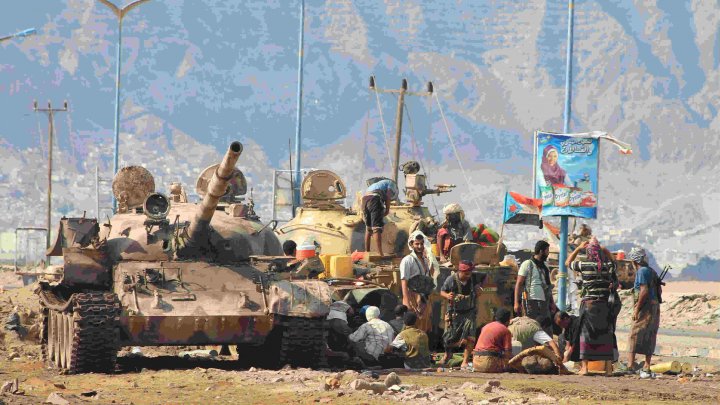www.aljazeerah.info
News, May 2015
Archives
Mission & Name
Conflict Terminology
Editorials
Gaza Holocaust
Gulf War
Isdood
Islam
News
News Photos
Opinion Editorials
US Foreign Policy (Dr. El-Najjar's Articles)
www.aljazeerah.info
|
Editorial Note: The following news reports are summaries from original sources. They may also include corrections of Arabic names and political terminology. Comments are in parentheses. |
As Fighting Rages in Yemen, UN Warns that Infrastructure on Brink of Collapse
May 5, 2015
 |
 |
| A Yemeni man searches for survivors under the rubble of houses destroyed by an overnight Saudi-led air strike on a residential area of the port city Adenís Dar Saad suburb on May 2, 2015 |
Loyalists of exiled Yemeni President Abedrabbo Mansour Hadi gather next to tanks on a road on the outskirts of the southern city of Aden |
Saudi-led airstrikes hit airport in Yemen's capital
SANAA, May 4 (Xinhua) --
Fighter jets of the Saudi-led alliance on Monday pounded Yemen's Sanaa international airport in the capital, setting two civilian passenger aircrafts on fire, the airport officials said.
"Two civilian aircrafts were hit and set on fire by Saudi airstrikes in the afternoon," one of the officials told Xinhua.
He said one plane was operated by Yemenia Airways and the other one by Yemeni Felix Airways.
Huge fire and columns of black smoke could be seen rising from the airport in northern Sanaa, according to witnesses.
It was the second airstrike targeting the airport in a week. On April 28, the warplanes destroyed the Sanaa international airport's runway and fuel station to prevent an Iranian plane from landing there.
However, attacks on the airport has halted humanitarian aid shipments to the capital, according to the airport officials.
There was no immediate report of casualties.
Meanwhile, provincial officials said the alliance's jets raided on Monday morning the Houthi gathering in Sarwah area in the central province of Marib, where ground fighting continued between tribal fighters and the Houthis who were trying to control the oil-produce province.
The Saudi-led coalition also attacked Houthi sites and forces led by former President Ali Abdullah Saleh in the southern provinces of Ibb and Taiz, said the officials.
No immediate reports of casualties, but residents in Marib, Ibb and Taiz said dozens of Houthis were killed in the airstrikes and by the tribal fighters loyal to exiled President Abd-Rabbu Mansour Hadi.
The death toll have reached more than 1,200 since the battles and airstrikes began in late March, and more than 3,000 people were wounded across the country, according to statistics released by the Yemeni government.
Hundreds of thousands of people, especially in the southern regions, were forced to flee their homes.
Saudi Arabia started on March 26 airstrikes against the Houthi group and forces loyal to Saleh who was accused of supporting the Houthis to overthrow Hadi, aiming to reinstate the Yemeni government.
On Sunday, sources said the Saudi-led coalition forces dispatched its first special unit of ground troops to Yemen's southern port city of Aden.
"The first Saudi-led coalition troops arrived in Aden and have engaged in the fighting alongside with tribal militia allied with Yemen's President Abdu-Rabbu Mansour Hadi in Aden's neighborhood of KhorMaksar," a senior government official based in Aden said on condition of anonymity.
"They are fighting with pro-Hadi militia against the Shiite Houthi gunmen near Aden's international airport at the moment," the government source said.
The number of that Saudi-led ground forces are about 40 to 50, a spokesman of the tribal militia told Xinhua. The soldiers were wearing Yemeni clothes, not army uniforms, witnesses said.
However, Saudi Arabia later denied such reports. Spokesman for the Saudi-led coalition Ahmed al-Asiri said in a statement that "there are no foreign forces in Aden, but the coalition continues to help fight against the Houthi militia.".
Editor: Mu Xuequan
UN warns that Yemenís infrastructure on brink of collapse
Saleh al-Obeidi, AFP |
Text by FRANCE 24, 2015-05-03
Key infrastructure in war-torn Yemen, including water supplies, health services and telecommunications, are on the verge of breaking down due to a major fuel shortage, a United Nations official said Saturday.
"The services still available in the country in terms of health, water, food are quickly disappearing because fuel is no longer being brought into the country," Johannes van der Klaauw told AFP in Djibouti.
"Without fuel hospitals can't work, ambulances can't go out. You can't have the water system working because water has to be pumped. The telecommunication network risks shutting down. This is all extremely preoccupying. If something is not done in the next few days in terms of bringing fuel and food into the country, Yemen is going to come to a complete stand-still," he warned.
The official said an arms embargo was also having an impact on the delivery of humanitarian supplies.
"We have the ships which can dock into the ports, we have the aircraft. However, the arms embargo has unintended consequences for humanitarian aid," he said, adding that UN Secretary General Ban Ki-moon has called for a "humanitarian pause".
"We must find a way to have this happen. At least for a couple of days."
Violence has been spreading across Yemen since Houthi rebels seized the capital Sanaa last year and effectively removed President Abd-Rabbu Mansour Hadi.
The Iran-allied Houthis and soldiers loyal to former Yemen President Ali Abdullah Saleh have been fighting alongside each other on the Arabian peninsula. A Saudi-led coalition launched air strikes against the Houthis in March.
The World Health Organization reported late last month that 1,080 people had been killed and thousands more injured in fighting in Yemen between March 19 and April 20 alone. Meanwhile, the UN estimates that at least 300,000 people have been displaced by the conflict.
(FRANCE 24 with AFP, REUTERS)
Gulf ministers meet as Yemen fighting rages
France 24, 2015-04-30
Gulf foreign ministers met Thursday in the Saudi capital for talks on their military operation in Yemen, where Iran-backed Houthi rebels have defied air strikes and refused to give ground.
Ministers from the six-member Gulf Cooperation Council, which includes Bahrain, Kuwait, Oman, Qatar, Saudi Arabia and the United Arab Emirates, huddled in Riyadh as warplanes of the Saudi-led coalition pressed on with attacks on rebel positions.
Qatar's Foreign Minister Khalid al-Attiyah, chairing the meeting, said the air campaign in Yemen demonstrated the Gulf monarchies' commitment to helping their impoverished neighbour.
"The Decisive Storm operation showed the GCC's historical responsibility towards Yemen," he said.
Gulf nations "will work with the international community to achieve legitimacy and unity" in Yemen, he said, before the ministers continued their meeting in a closed session.
The air strikes were launched in late March as the Shiite Houthi fighters and their allies advanced on the main southern city of Aden, where President Abedrabbo Mansour Hadi fled after the rebels seized large parts of the country including the capital Sanaa.
Hadi escaped to Riyadh, which launched the campaign fearing an Iran-friendly regime taking control of its southern neighbour.
Iran has denied charges of arming the rebels, called for an end to the strikes and pushed for a negotiated settlement.
The conflict has heightened tensions in the region and Iran said Thursday that two of its destroyers sent to the Gulf of Aden had reached the entrance of Bab al-Mandab, a strategic strait between Yemen and Djibouti in the Horn of Africa.
Tehran said the destroyers would stay around the strait until late June, but stressed that its ships would not enter the territorial waters of other countries.
The coalition has imposed an air and sea blockade on Yemen.
Last week US officials said an American aircraft carrier and a cruiser left the waters off Yemen and headed back to the Gulf after an Iranian naval convoy also turned back from the area.
Washington suspected the convoy of carrying weapons destined for the Houthis.
Thursday's meeting was aimed at laying the groundwork for a GCC leaders' summit on Tuesday, which will also be attended by French President Francois Hollande.
Fresh strikes, clashes
Leaders of GCC countries -- many of which are taking part in the US-led air campaign against the Islamic State group in Iraq and Syria -- are also preparing to meet US President Barack Obama in mid-May in Washington.
All GCC members except Oman are part of the coalition that Riyadh assembled for the air war in Yemen.
The coalition strikes continued on Thursday, despite an announcement last week that the campaign was moving into a new phase.
The rebels have refused to withdraw from territory they seized, in defiance of a UN Security Council resolution imposing an arms embargo and sanctions on their leaders.
Warplanes hit Houthi positions in Aden in the districts of Khor Maksar and Dar Saad, helping pro-government forces to retake positions, sources among the southern fighters said.
Eight people were killed in overnight clashes in Aden, including five pro-government fighters and three civilians, the city's health chief Al-Khader Laswar said.
He said 44 others were wounded. Details of losses on the rebel side were not available.
The Houthi fighters have joined forces with troops loyal to former strongman Ali Abdullah Saleh, clashing in Aden with local militia known as "Popular Resistance" units that have sided with Hadi.
Warplanes also hit rebel targets in the central city of Taez, a local government official said, after overnight raids targeted Houthis in the southern provinces of Lahj and Abyan, according to pro-government fighters.
The United Nations says more than 1,000 people have been killed in fighting in Yemen since late March.
Saudi Arabia was represented at Thursday's talks by deputy foreign minister Prince Abdul Aziz bin Abdullah, after Prince Saud al-Faisal stepped down from the post of top Saudi diplomat for health reasons.
King Salman on Wednesday named Saudi Arabia's ambassador to Washington Adel al-Jubeir to replace Saud, who had been foreign minister since 1975.
(AFP)
***
Share this article with your facebook friendsFair Use Notice
This site contains copyrighted material the
use of which has not always been specifically authorized by the copyright
owner. We are making such material available in our efforts to advance
understanding of environmental, political, human rights, economic,
democracy, scientific, and social justice issues, etc. We believe this
constitutes a 'fair use' of any such copyrighted material as provided for
in section 107 of the US Copyright Law. In accordance with Title 17 U.S.C.
Section 107, the material on this site is
distributed without profit to those
who have expressed a prior interest in receiving the included information
for research and educational purposes. For more information go to: http://www.law.cornell.edu/uscode/17/107.shtml.
If you wish to use copyrighted material from this site for purposes of
your own that go beyond 'fair use', you must obtain permission from the
copyright owner.
|
|
|
|
||
|
||||||


